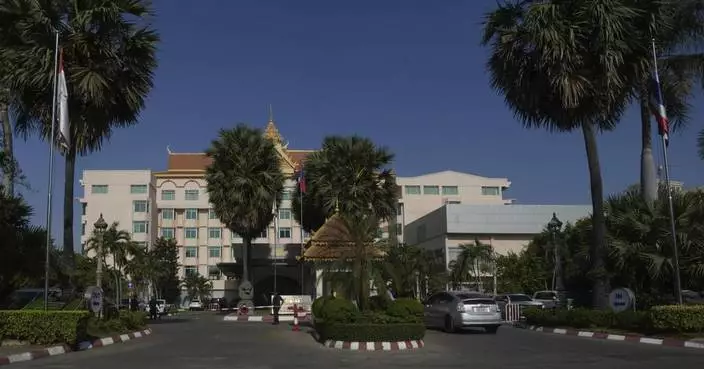Spanish politicians are swapping campaign buses for tractors, buddying up with hunters and inspecting home-grown tomatoes in Spain's often-neglected rural regions as they hunt for votes in Sunday's general election, one of the country's most polarized votes in decades.
The ballot comes as Spain's traditional bipartisan political landscape — which used to revolve around the left-wing Socialists and the conservative Popular Party — has fractured into five main political parties, including a far-right populist newcomer. That has spurred a race for votes in Spain's overrepresented hinterland, where nearly one-third of the seats in parliament's lower house are up for grabs.
Click to Gallery
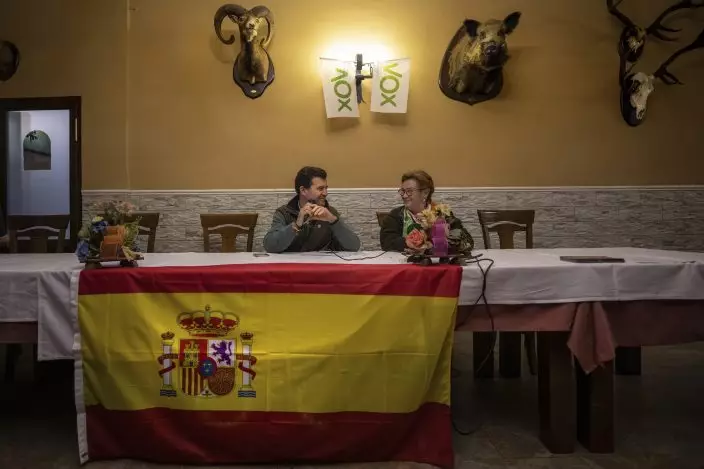
In this April 10, 2019 photo, Vox's Ciudad Real provincial candidate Ricardo Chamorro, left, and Toyan Patón during a meeting with local farmers at a bar in Brazatortas, on the edge of the Alcudia valley, central Spain. A lawyer with solid traditional convictions, Chamorro's political career reflects the tectonic changes undergoing Spain's right. He fell out with the Popular Party (PP), the alpha male of Spanish politics for decades, over corruption scandals and what he sees as a departure from conservative moral positions. Although tempted by the center-right Citizens party's resolve against separatism, he ended up embracing the national-populism of Vox, which also vows to defend Spain from Muslims and communists, and whose program echoes the "get back control" mantra of other anti-elitist movements around the globe. Following the trotted path of far-right parties elsewhere, Vox is posed to grab 29 to 37 deputies in the national parliament on Sunday, a big splash for a party that only last year made its first big advance with a win in the regional election in Andalusia, a Socialist stronghold. (AP PhotoBernat Armangue)
In this April 10, 2019 photo, Marcy Jurado poses for a portrait in La Bienvenida village, central Spain. When the last student left and the school closed, Jurado knew that her village, the heart of the Alcudia valley in central Spain, was about to stop beating. One by one, gone were also the health center, the church and the local bar, the valley's soul. "That's when we knew there was no way back," the 64 year-old said looking down to the empty square of La Bienvenida. (AP PhotoBernat Armangue)
In this April 10, 2019 photo, villagers gather at a bar in Brazatortas, on the edge of the Alcudia valley, central Spain. With nearly 400,000 voters in a country of 37 million, Ciudad Real is a microcosm of the weight of rural areas in national politics. In the last general election, in 2016, three of the five deputies chosen by the province went to the PP conservatives and two to the Socialists. But reflecting the crisis of bipartisan politics, polls are predicting now at least two seats for the Socialists and one for PP, with the remaining two going for a few thousand votes of difference to either two of the once-dominant parties, or even a split between the center-right Citizens and Vox. (AP PhotoBernat Armangue)
Spanish politicians are swapping campaign buses for tractors, buddying up with hunters and inspecting home-grown tomatoes in Spain's often-neglected rural regions as they hunt for votes in Sunday's general election, one of the country's most polarized votes in decades.
In this April 10, 2019 photo, villagers attend a meeting with Spanish far right party Vox at a bar in Brazatortas, on the edge of the Alcudia valley, central Spain. The April 28 election also comes as Spain's traditional bipartisan politics have crumbled into five main contenders, spurring the race for votes in the overrepresented hinterland, where nearly one third of seats in the parliament's lower house are up for grabs. Following the trotted path of far-right parties elsewhere, Vox is posed to grab 29 to 37 deputies in the national parliament on Sunday, a big splash for a party that only last year made its first big advance with a win in the regional election in Andalusia, a Socialist stronghold. (AP PhotoBernat Armangue)

In this April 10, 2019 photo, Vox's Ciudad Real provincial candidate Ricardo Chamorro, left, and Toyan Patón during a meeting with local farmers at a bar in Brazatortas, on the edge of the Alcudia valley, central Spain. A lawyer with solid traditional convictions, Chamorro's political career reflects the tectonic changes undergoing Spain's right. He fell out with the Popular Party (PP), the alpha male of Spanish politics for decades, over corruption scandals and what he sees as a departure from conservative moral positions. Although tempted by the center-right Citizens party's resolve against separatism, he ended up embracing the national-populism of Vox, which also vows to defend Spain from Muslims and communists, and whose program echoes the "get back control" mantra of other anti-elitist movements around the globe. Following the trotted path of far-right parties elsewhere, Vox is posed to grab 29 to 37 deputies in the national parliament on Sunday, a big splash for a party that only last year made its first big advance with a win in the regional election in Andalusia, a Socialist stronghold. (AP PhotoBernat Armangue)
In this April 10, 2019 photo, cattle graze near La Bienvenida village, central Spain. Nestled at the top of a hill, the village of La Bienvenida has gone from hosting 50 families only 20 years ago to “for sale” signs on house after house. A 37-year-old dairy farmer nearby is the breadwinner in the one and only inhabited house around.(AP PhotoBernat Armangue)
In this April 10, 2019 photo, Alfonso Ruiz poses for a portrait in La Bienvenida village, central Spain. Once the mayor of his village, today Alfonso, his wife Marcy and their son are the only residents left. (AP PhotoBernat Armangue)
In this April 10, 2019 photo, Marcy Jurado poses for a portrait in La Bienvenida village, central Spain. When the last student left and the school closed, Jurado knew that her village, the heart of the Alcudia valley in central Spain, was about to stop beating. One by one, gone were also the health center, the church and the local bar, the valley's soul. "That's when we knew there was no way back," the 64 year-old said looking down to the empty square of La Bienvenida. (AP PhotoBernat Armangue)
In this April 10, 2019, photo, a sealed door of a house for sale in Puertollano, near Ciudad Real, central Spain. Spanish politicians are swapping campaign buses for tractors, buddying up with hunters and inspecting home-grown tomatoes in Spain’s often-neglected rural regions as they hunt for votes in Sunday’s general election, one of the country’s most polarized votes in decades.(AP PhotoBernat Armangue)
In this April 10, 2019 photo, farmers attend a meeting with Spanish far right party Vox at a bar in Brazatortas, on the edge of the Alcudia valley, central Spain. The April 28 election also comes as Spain's traditional bipartisan politics have crumbled into five main contenders, spurring the race for votes in the overrepresented hinterland, where nearly one third of seats in the parliament's lower house are up for grabs. Following the trotted path of far-right parties elsewhere, Vox is posed to grab 29 to 37 deputies in the national parliament on Sunday, a big splash for a party that only last year made its first big advance with a win in the regional election in Andalusia, a Socialist stronghold. (AP PhotoBernat Armangue)
In this April 10, 2019 photo, villagers gather at a bar in Brazatortas, on the edge of the Alcudia valley, central Spain. With nearly 400,000 voters in a country of 37 million, Ciudad Real is a microcosm of the weight of rural areas in national politics. In the last general election, in 2016, three of the five deputies chosen by the province went to the PP conservatives and two to the Socialists. But reflecting the crisis of bipartisan politics, polls are predicting now at least two seats for the Socialists and one for PP, with the remaining two going for a few thousand votes of difference to either two of the once-dominant parties, or even a split between the center-right Citizens and Vox. (AP PhotoBernat Armangue)
Spain's electoral rules grant a bigger say in parliament's lower house to provinces with shrinking populations. A few thousand votes in these areas can swing a win for one party or another, turning the "every vote counts" cliché into a reality for candidates far from the big cities.
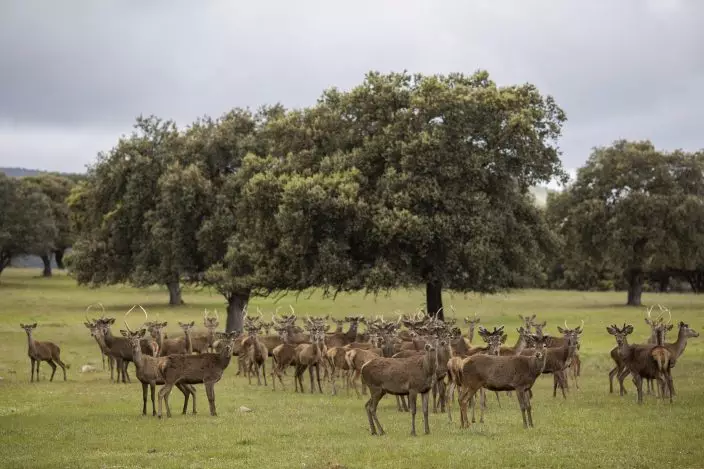
In this April 10, 2019 photo, deers graze at Lagunes ranch, central Spain. Spanish politicians are swapping campaign buses for tractors, buddying up with hunters and inspecting home-grown tomatoes in Spain’s often-neglected rural regions as they hunt for votes in Sunday’s general election.(AP PhotoBernat Armangue)
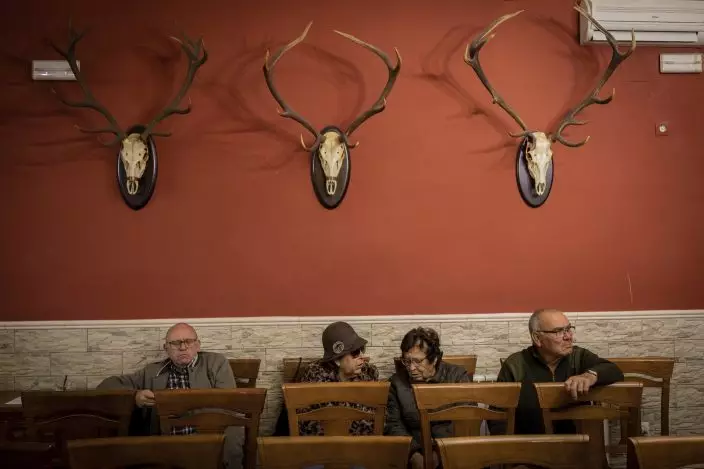
In this April 10, 2019 photo, villagers attend a meeting with Spanish far right party Vox at a bar in Brazatortas, on the edge of the Alcudia valley, central Spain. The April 28 election also comes as Spain's traditional bipartisan politics have crumbled into five main contenders, spurring the race for votes in the overrepresented hinterland, where nearly one third of seats in the parliament's lower house are up for grabs. Following the trotted path of far-right parties elsewhere, Vox is posed to grab 29 to 37 deputies in the national parliament on Sunday, a big splash for a party that only last year made its first big advance with a win in the regional election in Andalusia, a Socialist stronghold. (AP PhotoBernat Armangue)

In this April 10, 2019 photo, Vox's Ciudad Real provincial candidate Ricardo Chamorro, left, and Toyan Patón during a meeting with local farmers at a bar in Brazatortas, on the edge of the Alcudia valley, central Spain. A lawyer with solid traditional convictions, Chamorro's political career reflects the tectonic changes undergoing Spain's right. He fell out with the Popular Party (PP), the alpha male of Spanish politics for decades, over corruption scandals and what he sees as a departure from conservative moral positions. Although tempted by the center-right Citizens party's resolve against separatism, he ended up embracing the national-populism of Vox, which also vows to defend Spain from Muslims and communists, and whose program echoes the "get back control" mantra of other anti-elitist movements around the globe. Following the trotted path of far-right parties elsewhere, Vox is posed to grab 29 to 37 deputies in the national parliament on Sunday, a big splash for a party that only last year made its first big advance with a win in the regional election in Andalusia, a Socialist stronghold. (AP PhotoBernat Armangue)
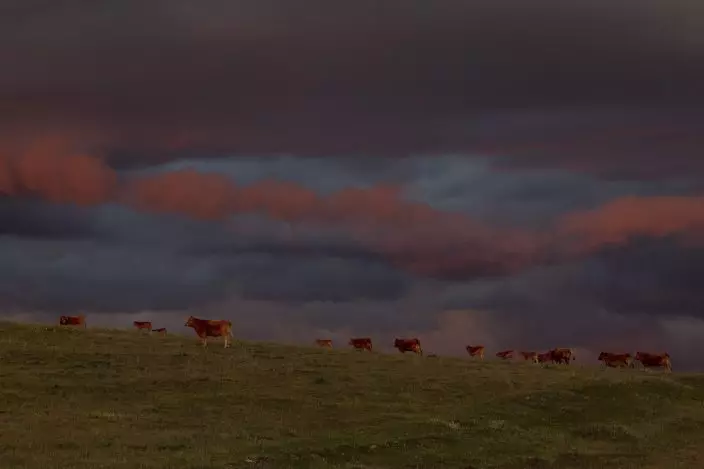
In this April 10, 2019 photo, cattle graze near La Bienvenida village, central Spain. Nestled at the top of a hill, the village of La Bienvenida has gone from hosting 50 families only 20 years ago to “for sale” signs on house after house. A 37-year-old dairy farmer nearby is the breadwinner in the one and only inhabited house around.(AP PhotoBernat Armangue)
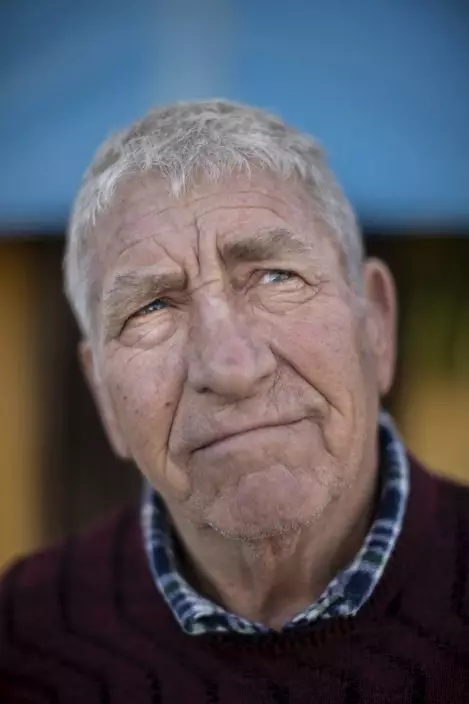
In this April 10, 2019 photo, Alfonso Ruiz poses for a portrait in La Bienvenida village, central Spain. Once the mayor of his village, today Alfonso, his wife Marcy and their son are the only residents left. (AP PhotoBernat Armangue)
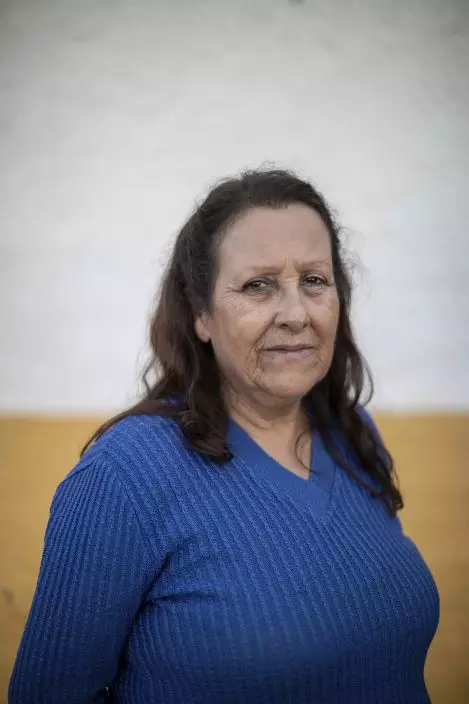
In this April 10, 2019 photo, Marcy Jurado poses for a portrait in La Bienvenida village, central Spain. When the last student left and the school closed, Jurado knew that her village, the heart of the Alcudia valley in central Spain, was about to stop beating. One by one, gone were also the health center, the church and the local bar, the valley's soul. "That's when we knew there was no way back," the 64 year-old said looking down to the empty square of La Bienvenida. (AP PhotoBernat Armangue)
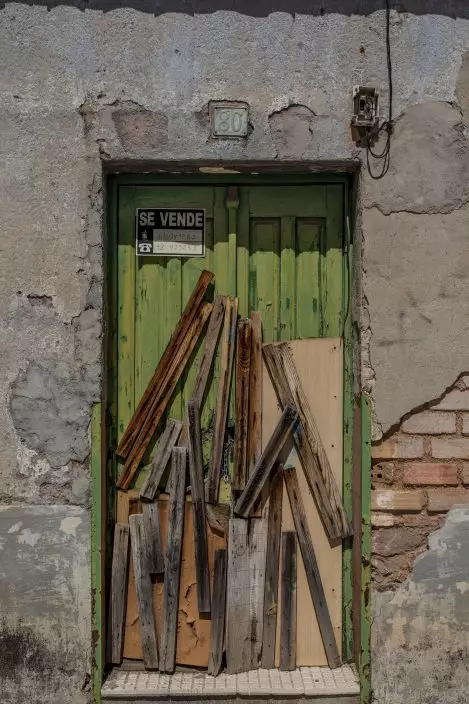
In this April 10, 2019, photo, a sealed door of a house for sale in Puertollano, near Ciudad Real, central Spain. Spanish politicians are swapping campaign buses for tractors, buddying up with hunters and inspecting home-grown tomatoes in Spain’s often-neglected rural regions as they hunt for votes in Sunday’s general election, one of the country’s most polarized votes in decades.(AP PhotoBernat Armangue)
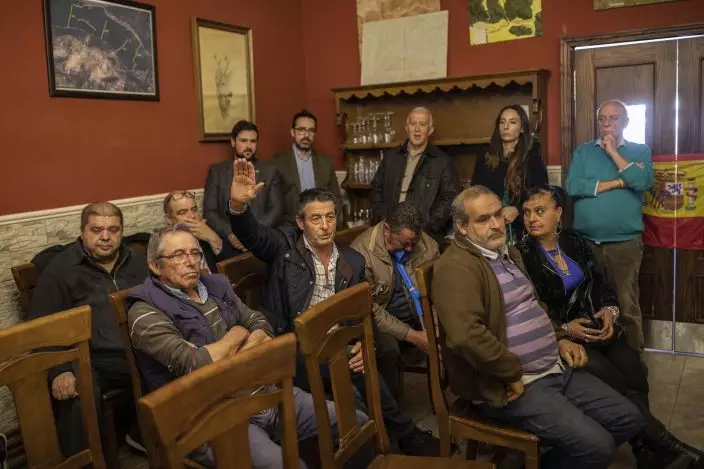
In this April 10, 2019 photo, farmers attend a meeting with Spanish far right party Vox at a bar in Brazatortas, on the edge of the Alcudia valley, central Spain. The April 28 election also comes as Spain's traditional bipartisan politics have crumbled into five main contenders, spurring the race for votes in the overrepresented hinterland, where nearly one third of seats in the parliament's lower house are up for grabs. Following the trotted path of far-right parties elsewhere, Vox is posed to grab 29 to 37 deputies in the national parliament on Sunday, a big splash for a party that only last year made its first big advance with a win in the regional election in Andalusia, a Socialist stronghold. (AP PhotoBernat Armangue)
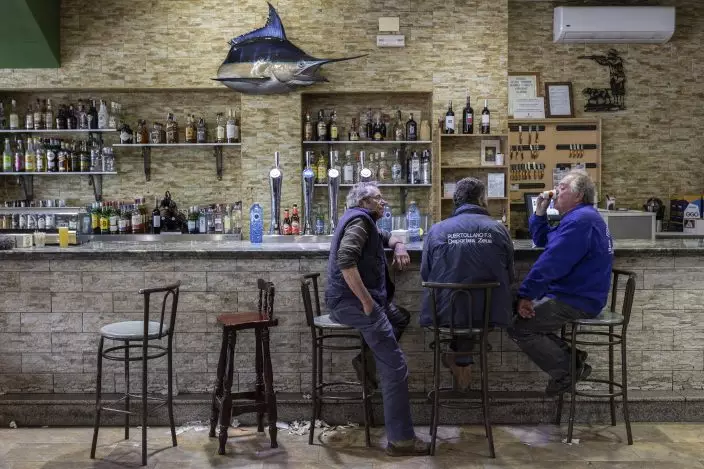
In this April 10, 2019 photo, villagers gather at a bar in Brazatortas, on the edge of the Alcudia valley, central Spain. With nearly 400,000 voters in a country of 37 million, Ciudad Real is a microcosm of the weight of rural areas in national politics. In the last general election, in 2016, three of the five deputies chosen by the province went to the PP conservatives and two to the Socialists. But reflecting the crisis of bipartisan politics, polls are predicting now at least two seats for the Socialists and one for PP, with the remaining two going for a few thousand votes of difference to either two of the once-dominant parties, or even a split between the center-right Citizens and Vox. (AP PhotoBernat Armangue)
BEIRUT (AP) — The European Union announced Thursday an aid package for Lebanon of 1 billion euros — about $1.06 billion — much of which will go to boost border control to halt the flow of asylum seekers and migrants from the small, crisis-wracked country across the Mediterranean Sea to Cyprus and Italy.
The deal follows other EU aid packages for countries such as Egypt, Tunisia and Mauritania to fortify their borders. It comes against a backdrop of increasing hostility toward Syrian refugees in Lebanon and a major surge in irregular migration of Syrian refugees from Lebanon to Cyprus.
European Union Commission President Ursula von der Leyen said during a Beirut visit with Cypriot President Nikos Christodoulides that the aid distribution will start this year and last till 2027.
The bulk of the aid — 736 million euros — would go to support Syrian refugees “and other vulnerable groups” in Lebanon, while 200 million euros are meant to bolster Lebanese security services in enforcing border and migration control, according to figures provided by the Cypriot government.
An unspecified amount would go to Lebanese fishermen, to discourage them from selling their boats to smugglers.
Von der Leyen said the EU will also work on a “more structured approach to voluntary return" of Syrian refugees "in close cooperation with” the U.N. refugee agency. The bloc will continue to maintain “legal pathways” for resettlement of refugees in Europe, she said.
Lebanon's caretaker Prime Minister Najib Mikati praised the package, saying that “Lebanon’s security is security for European countries and vice versa,” and that an escalation of the crisis ”will not be limited to Lebanon but will extend to Europe."
Lebanon, which has been in the throes of a severe financial crisis since 2019, hosts nearly 780,000 registered Syrian refugees and hundreds of thousands more who are unregistered, the world's highest refugee population per capita.
Lebanese political officials have for years urged the international community to resettle the refugees in other countries or assist their return to Syria — voluntarily or not. Lebanese security forces have stepped up deportations of Syrians over the past year.
Tensions further flared after an official with the Christian nationalist Lebanese Forces party, Pascal Suleiman, was killed last month in what military officials said was a botched carjacking by a Syrian gang. The incident prompted outbreaks of anti-Syrian violence by vigilante groups.
Meanwhile, Cypriot authorities complain the island nation has been overwhelmed by irregular migration of Syrian asylum seekers, many of them coming on boats from Lebanon.
The UNHCR in Lebanon said it had verified 59 “actual or attempted” departures by boats carrying a total of 3,191 passengers from Lebanon between January and mid-April, compared to three documented boat movements carrying 54 passengers in the same period last year. Usually, few boats attempt the much more dangerous crossing in the winter. In all of 2023, UNHCR recorded 65 boat departures carrying 3,927 passengers.
Cyprus has taken a new approach to halting the flow of migrants. Last month, it suspended processing of Syrian asylum applications, and human rights groups accused the Cypriot coast guard of forcibly turning back five boats carrying about 500 asylum seekers coming from Lebanon. Cypriot officials have denied this.
Bassel al-Shayoukh, a Syrian refugee from Idlib living in Lebanon since 2014, said his brother and several cousins and nephews were on one of the boats turned back. Now he wants to make the journey himself.
“In the beginning I thought that in a year or two the war would be over in Syria,” he said, but it dragged on, while in Lebanon “every year ... the situation began to get worse.”
Shayoukh said he fears being beaten by vigilantes or deported to Syria after Lebanese authorities declined to renew his residency permit.
His 17-year-old nephew, who declined to give his name fearing for his safety, said the Cypriot coast guard started making waves to push the boat he was on away. “I was terrified... I don’t know how to swim,” he said. “I thought we were going to die.”
The people on the boats “stayed three days without food or water” before turning back to Lebanon, the teen added.
Back in Lebanon, they were detained by the army; those registered with UNHCR were released and the others deported.
Mohammed Sablouh, a Lebanese human rights lawyer who works on refugee and migrant cases, says Lebanese authorities are deliberately “turning a blind eye" to the surge in migration to "pressure the international community.”
The Lebanese army did not respond to a request for comment on their measures to combat smuggling.
Thursday's aid announcement comes ahead of the annual fundraising conference for the Syrian crisis in Brussels later this month. After 13 years of civil war, donor fatigue has set in while the world’s attention is occupied by the humanitarian fallout of more recent conflicts in Ukraine and Gaza.
The Cypriot president said Thursday was a “historic day” and called for European officials to go farther and declare some areas of Syria safe for return.
“The current situation is not sustainable for Lebanon. It is not sustainable for Cyprus, it is not sustainable for the European Union,” Christodoulides said.
But not all Lebanese officials are convinced the European aid would solve the problem.
Lebanese Forces party head Samir Geagea told The Associated Press earlier this week that European authorities are mainly concerned “that the refugees don’t go to Europe."
"For us the problem is that we cannot have our country drowning in illegal Syrian refugees,” Geagea said, urging for Syrians to be sent back to either government or opposition-held areas of the neighboring country.
But Shayoukh says he has nowhere to go.
The Damascus government wants him for opposing Syrian President Bashar Assad, he said, while the Islamist group that now controls his hometown behaves "the same way as the regime’s intelligence services” in crushing dissidents.
Associated Press writer Menelaos Hadjicostis in Nicosia, Cyprus, contributed to this report.
Follow AP’s global migration coverage at: https://apnews.com/hub/migration

Lebanese caretaker Prime Minister Najib Mikati, center, speaks during his meeting with Cyprus' President Nikos Christodoulides, left, and President of the European Commission Ursula von der Leyen at the government palace in Beirut, Lebanon, Thursday, May 2, 2024. (AP Photo/Hassan Ammar)
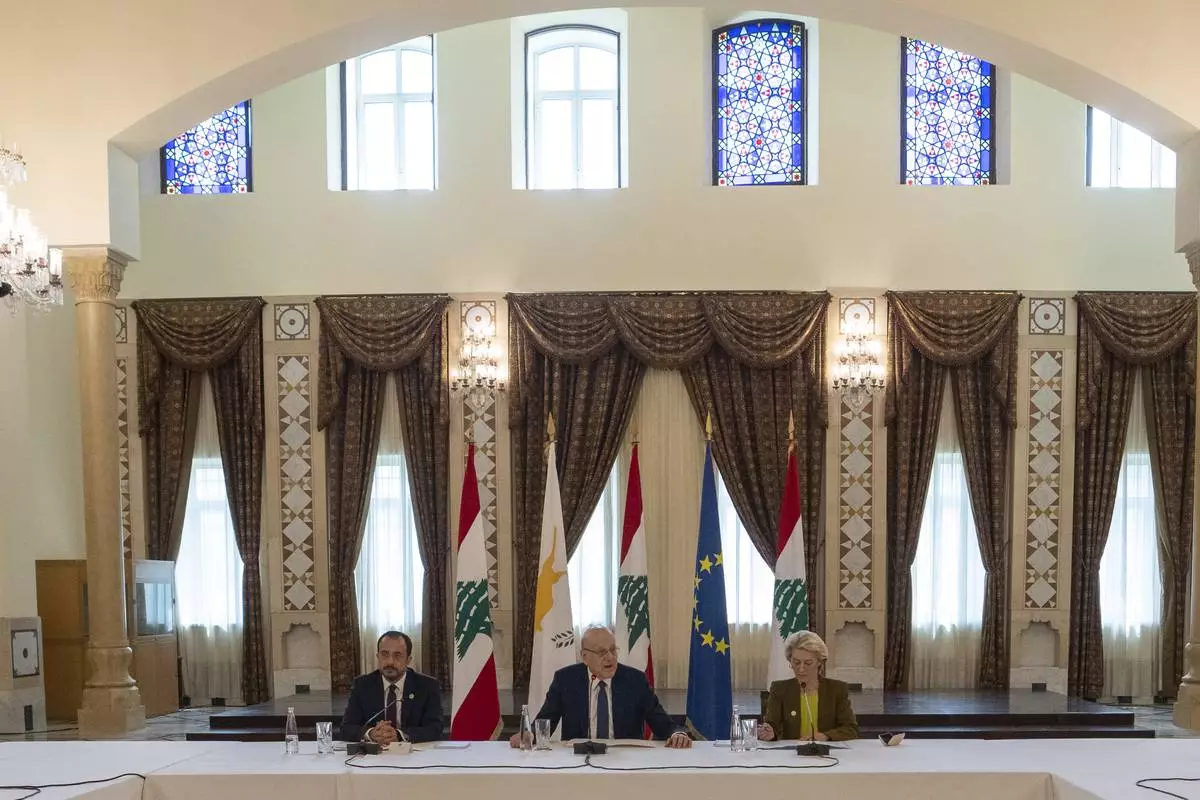
Lebanese caretaker Prime Minister Najib Mikati, center, speaks during his meeting with Cyprus' President Nikos Christodoulides, left, and President of the European Commission Ursula von der Leyen at the government palace in Beirut, Lebanon, Thursday, May 2, 2024. (AP Photo/Hassan Ammar)

Lebanese caretaker Prime Minister Najib Mikati, center, welcomes Cyprus' president Nikos Christodoulides, left, and President of the European Commission Ursula von der Leyen before their meeting at the government palace in Beirut, Lebanon, Thursday, May 2, 2024. (AP Photo/Hassan Ammar)
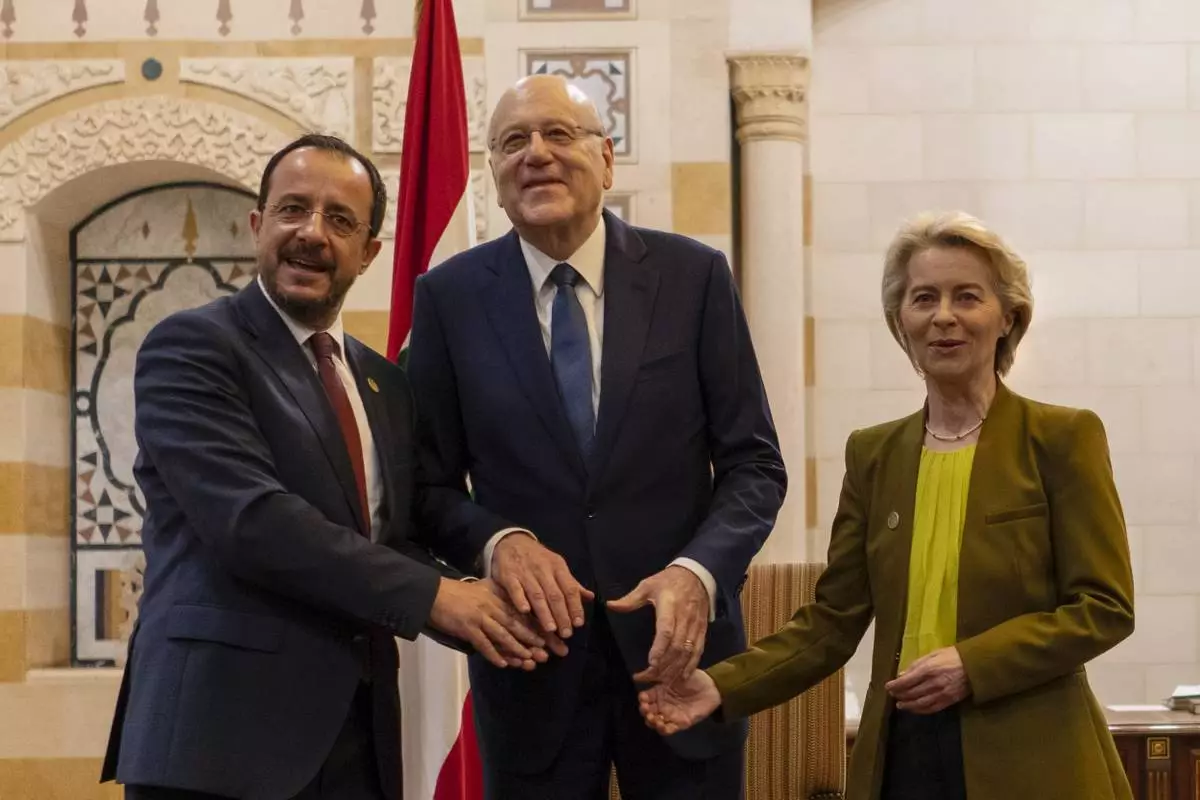
Lebanese caretaker Prime Minister Najib Mikati, center, Cyprus' President Nikos Christodoulides, left, and President of the European Commission Ursula von der Leyen pose for photograph at the government palace in Beirut, Lebanon, Thursday, May 2, 2024. (AP Photo/Hassan Ammar)

Lebanese caretaker Prime Minister Najib Mikati, right, welcomes Cyprus' president Nikos Christodoulides before their meeting at the government palace in Beirut, Lebanon, Thursday, May 2, 2024. (AP Photo/Hassan Ammar)

Cyprus' President Nikos Christodoulides, left, and President of the European Commission Ursula von der Leyen, center, review an honor guard upon their arrival to meet with the Lebanese Speaker Nabih Berri, in Beirut, Thursday, May 2, 2024. (AP Photo/Hussein Malla)

Lebanese caretaker Prime Minister Najib Mikati, center, speaks during his meeting with Cyprus' President Nikos Christodoulides, left, and President of the European Commission Ursula von der Leyen at the government palace in Beirut, Lebanon, Thursday, May 2, 2024. (AP Photo/Hassan Ammar)
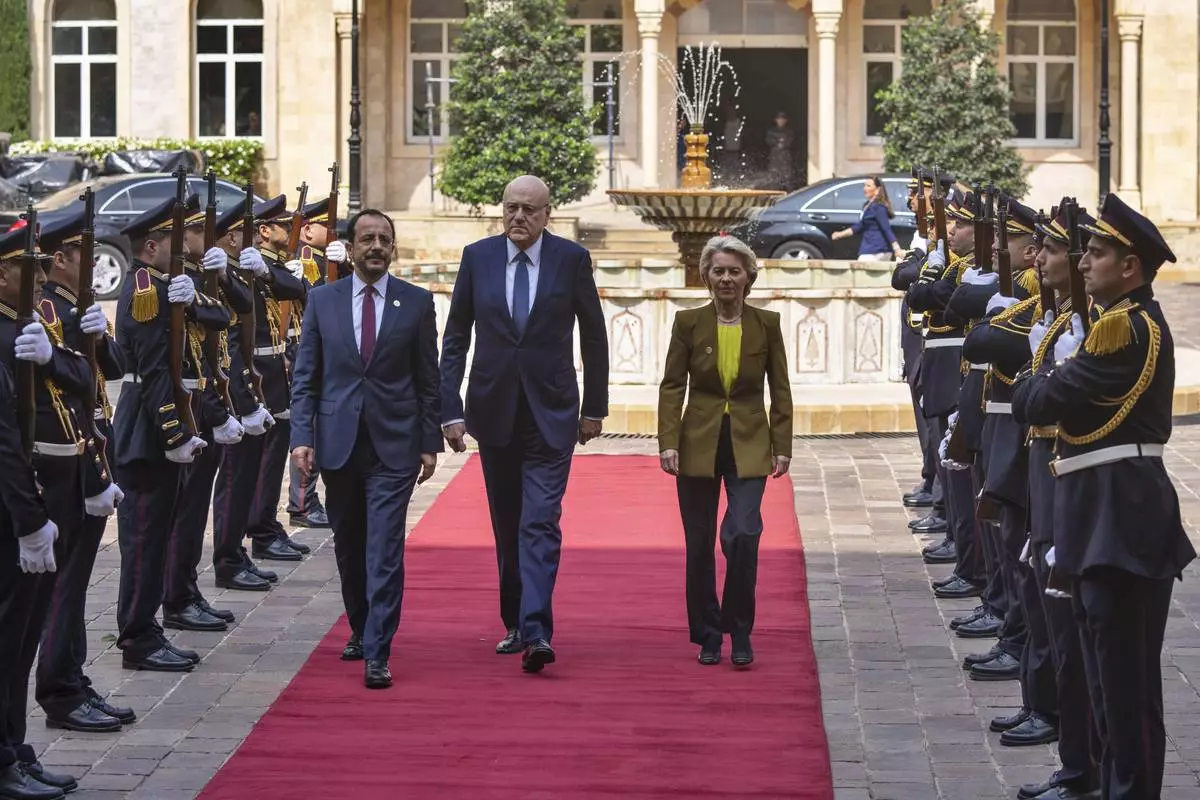
Lebanese caretaker Prime Minister Najib Mikati, center, welcomes Cyprus' President Nikos Christodoulides, left, and President of the European Commission Ursula von der Leyen at the government palace in Beirut, Lebanon, Thursday, May 2, 2024. (AP Photo/Hassan Ammar)





















